Collective challenges require collective solutions FAST
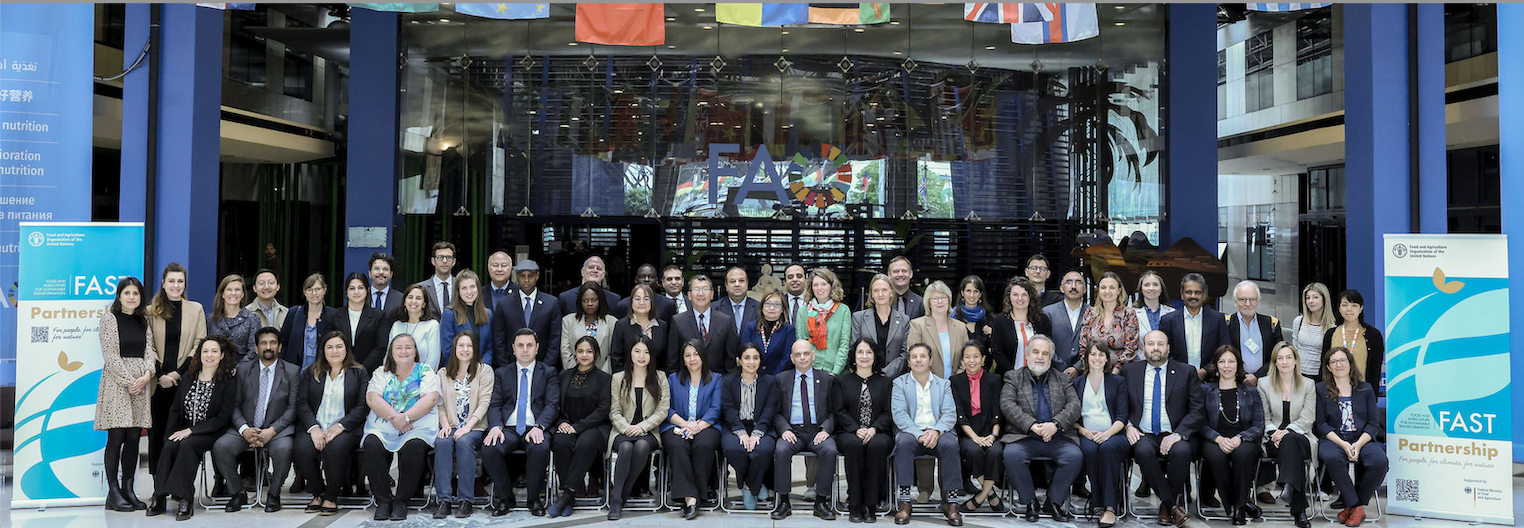
The FAST Partnership meeting in FAO headquarters explored concrete ways in which the Partnership can unlock climate investments in agrifood systems for the most vulnerable.
At a critical time when climate-related development contributions to agrifood systems continue to spiral on a downward trajectory, the Food and Agriculture for Sustainable Transformation (FAST) Partnership gathered in FAO headquarters (and online) from 22-24 April 2024 to discuss the structure and work plan of the Partnership. The three-day meeting was attended by over 80 participants including representatives from 20 Members and six Observers of the Partnership.
The FAST Partnership brings together governments, intergovernmental organizations, civil society organizations, youth and farmers’ organizations, multilateral development banks, and global and regional networks. It is supported by the Federal Ministry of Food and Agriculture of Germany (BMEL) and facilitated by FAO.
The Partnership represents a unique opportunity to address gaps and challenges concerning the quality and quantity of climate finance allocated to agrifood systems. Activities discussed by Members in the Partnership Meeting included setting up mechanisms for peer-to-peer learning on accessing domestic and international funding, analyzing and addressing gaps in access to climate finance for agrifood systems, and putting in place a carbon finance dashboard and a helpdesk focused on assisting farmers to access funds.
“Germany is delighted to have given funding to FAO to establish the FAST Partnership so that it can get into action fostering COP-to-COP collaboration and a multi-stakeholder approach. The FAO brings a lot of expertise and knowledge to further develop the Partnership”, said Anne Roth, BMEL, on the sidelines of the meeting.
Employing over 1.2 billion people worldwide, our agrifood systems are the key to achieving a more sustainable use of natural resources, but they are not getting the funding they deserve. Furthermore, funding is not reaching vulnerable communities including women, youth, family farmers, and Indigenous Peoples.
“There is an urgent need to move away from the narrative that sees agrifood systems as high-risk, pollution-heavy sectors that are unworthy of investment. In fact, agrifood systems hold a huge potential for climate action, providing cross-cutting solutions to food insecurity, poverty and biodiversity loss”, said Kaveh Zahedi, Director of FAO’s Office of Climate Change, Biodiversity and Environment (OCB) in his opening remarks.
“To unlock this potential and reach the most vulnerable, we need more climate finance and better climate finance”, he added.
Three takeaways from the meeting: how can the FAST Partnership have an impact where it matters?
- Unique vision with focus on reaching the most vulnerable
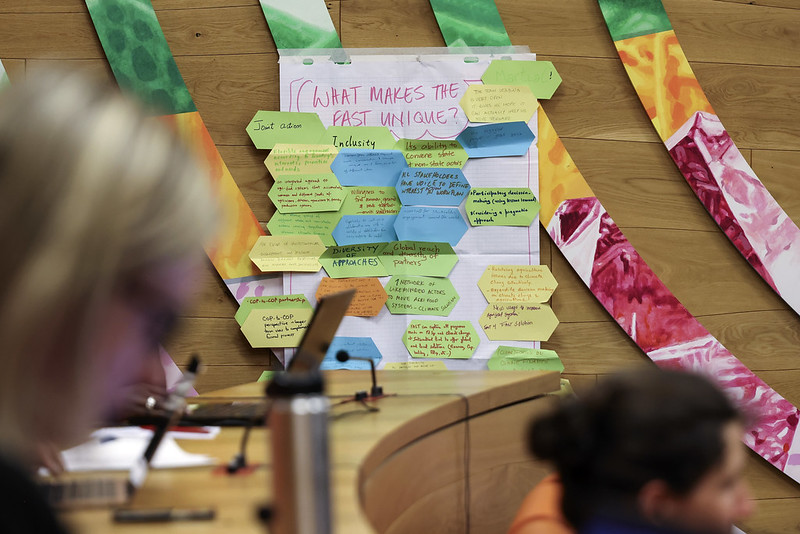
“The FAST Partnership is doing something different. While we often hear the words ‘women’ and ‘youth’, what makes us unique is that we are going to do something together with these stakeholders, taking advantage of regional networks to make grassroots action happen.”
Genna Tesdall, Director, Young Professionals for Agricultural Development (YPARD)
Preliminary findings from a mapping exercise undertaken by the FAST Partnership show that although there are many initiatives working on climate change, agrifood systems and finance, there are few working on the intersection of all three. As a member-driven partnership with a diversity of Members, and strong leadership from countries, the FAST Partnership addresses this gap by looking at access to finance from a 360-degree perspective. We know that to boost access to climate finance and overcome the bottlenecks many vulnerable groups face, it is also necessary to strengthen knowledge and capacity, and facilitate dialogue, supporting climate change policies that fully embed agrifood systems.
2. Builds on existing initiatives and regional mechanisms
“The FAST Partnership does not seek to replace other initiatives; it aims to connect and accelerate them.”
Martial Bernoux, Senior Natural Resources Officer (FAO) and FAST Partnership Task Force
The FAST Partnership is designed as a catalyst that builds on ongoing global and regional initiatives and coalitions to drive effective actions. For example, FAST Members like the Climate Action Platform in Agriculture for Latin America and the Caribbean (PLACA), the League of Arab States and the Inter-American Institute for Cooperation on Agriculture (IICA) can strengthen connections with countries and ongoing activities in their regions around access to finance while achieving their own objectives. In this way, different initiatives can complement each other’s work towards the broader achievement of the Sustainable Development Goals (SDGs) and Paris Agreement.
3. Fosters COP-to-COP collaboration to achieve the Paris Agreement and the SDGs
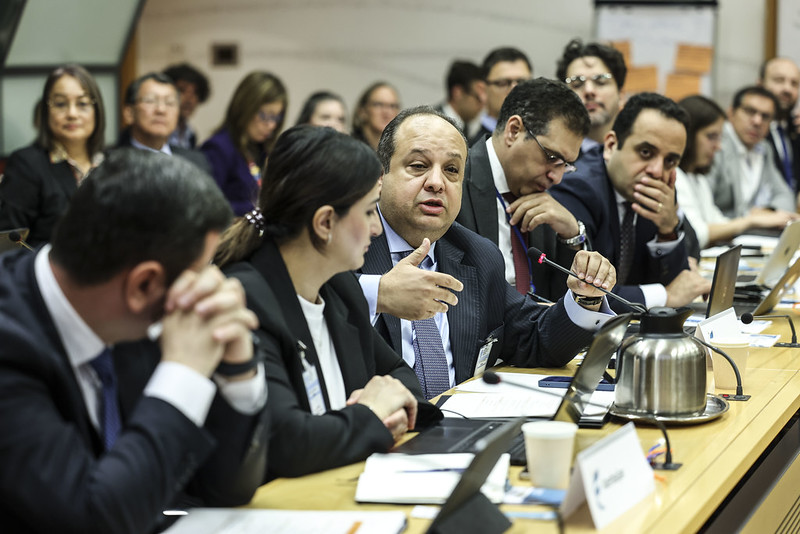
“The FAST Partnership stems from an initiative that comes from countries for countries.”
Ambassador Ayman Amin, Ministry of Foreign Affairs, Egypt.
Stemming from a consultative process involving a broad range of stakeholders, FAST was born as a COP27 Egyptian Presidency Initiative and taken to the next level by the COP28 UAE Presidency as a Partnership, with its first inception meeting taking place at COP28 on Food, Agriculture and Water Day.
Representatives from Egypt (COP27), Azerbaijan (COP29) and Brazil (COP30), all attended the FAST Partnership meeting. “Attending this important event of the FAST Partnership we are very aware that agriculture has gained prominence in the last COP agendas”, said Gafgaz Adigozalov, Negotiator, Ministry of Foreign Affairs, COP29 Presidency Action Agenda Team.
“The COP29 Presidency stands ready for promotion of coherent and innovative enhanced action on climate finance, mitigation, and adaptation for food, agriculture, and water,” he added.
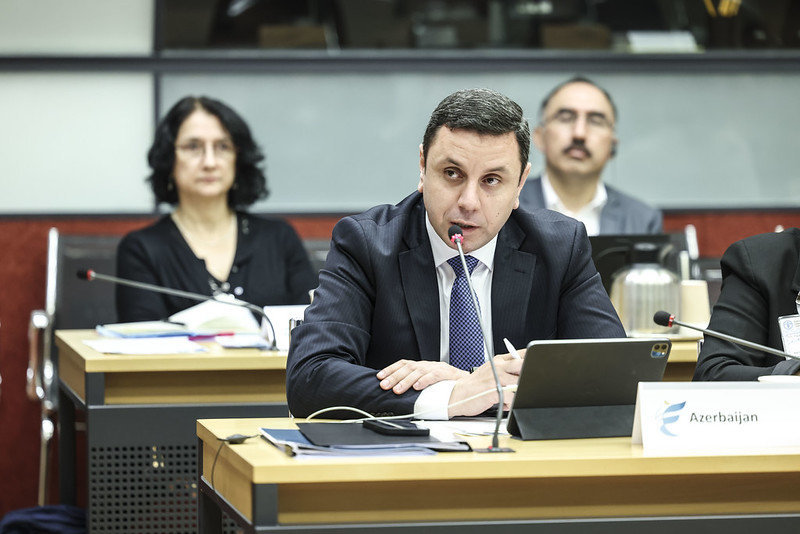
As we approach COP29 in Azerbaijan, where finance will take centre stage, the FAST Partnership plays an important role. The recent 2023 European State of the Climate report tells us that 2023 tied as the warmest year on record for Europe, with temperatures a concerning 2.6°C higher than pre-industrial levels. Europe warms at nearly double the global rate, fueling an increase in extreme weather events like heatwaves, wildfires, droughts and floods.
Adequate investment across the region is crucial to transform agrifood systems to be more efficient, resilient, and sustainable.
Get involved
The FAST Partnership now counts 29 Members and 10 Observers, with numbers growing daily.
The current Board includes Egypt, Germany, New Zealand, Uruguay, Senegal, Fiji, Dominican Republic, World Rural Forum (WRF), World Wide Fund for Nature (WWF), Young Professionals for Agricultural Development (YPARD), Consultative Group on International Agricultural Research (CGIAR). World Farmers’ Organization (WFO), and European Bank for Reconstruction and Development (EBRD).
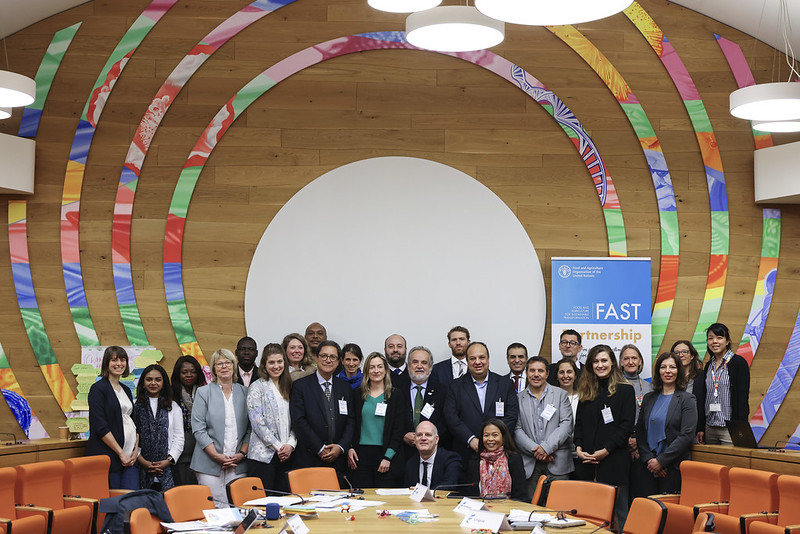
FAST Board Members held their first strategic meeting on 24 April 2024
If your country or organization would like to join the FAST Partnership or pledge technical or financial support to make this work happen, please fill out the short membership form.
The FAST Task Force is committed to fostering inclusivity and stands ready to support Members with activities. For more information, please email: [email protected]
Useful links
- FAST Partnership webpage
- FAST Partnership flyer
- Sign up to for FAST Partnership newsletter
- Photos of the FAST Members Meeting
